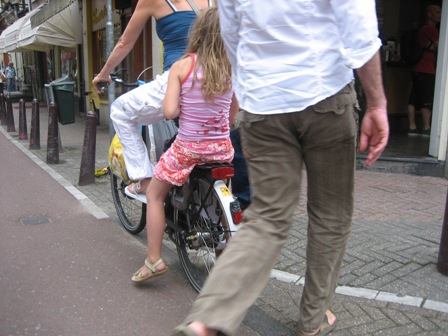
Amsterdam: physical culture in action
Waiting for the Queen
Apart from the music of marching bands and a little light horse racing, Her Majesty the Queen has not been noted for her cultural passions. Sport, apart from a few rich people’s pursuits such as polo, golf and the driving of highly polished carriages, has never featured high on the list of her family’s favourite pastimes. But how stubborn do you have to be not to have a look outside when the biggest annual sporting event in the world goes past your front gate?
The Tour de France is much maligned, quite rightly in some respects, but whatever troubles it may be facing it is an event of unparalleled sporting spectacle and a cultural festival that defines a nation. Leaving aside for a minute the frenzied estimates of the total audience that watched the two days of action in London and Kent, several million people turned out to see the Tour. The Queen, it seems, arranged to be away for the weekend. Is making sure you’re out worse than being at home but staying inside to sulk because horrible people are hanging off your railings? I’m enjoying a summer off from football and the rest of my life off from the Premier League but even I would open the curtains if Man Utd were playing in my garden (mainly to see how they coped with the tight pitch).
Her Majesty’s absence from the balcony that would have offered one of the finest vantage points in the Tour’s 104-year history demonstrates all too clearly that not everyone is enraptured by sport and hence it is not likely that on its own sport will be able to deliver the massive surge in participation in physical activity that the Treasury needs to make the NHS sustainable. Sport will play its part (a part that could be vastly and rapidly expanded if the Premier League could work out how they could make money out of it – but I digress) but a change of cultures and necessities is what make the most difference. Amsterdam is an example. The prevalence of cycle use is, even to an urban cycling aficionado such as myself, almost overwhelming, creating at once a city that is human in its scale, human in its speed and human in its understanding of what a city should be. Everyone rides a bike or walks, cars are viewed with polite disdain as a necessary inconvenience and you can eat chips in the street with a degree of style. The Dutch are very much like the Brits in their humour and many of their attitudes, and we should try to be more like them in our haircuts and our transport policies.
The London congestion charge has arguably done more for physical activity participation in the capital than any other political initiative since the introduction of compulsory military service. Ken was ridiculed, threatened and ostracised when he proposed it but in one of the bravest political moves of recent political times he introduced it. And it worked. More people walking, cycle use in the capital through the roof, more public transport. The next step should have been to expand the scheme conceptually rather than geographically. Instead of extending the congestion zone to the west, the mayor should have banned all private cars from the existing zone, creating a huge increase in physical activity by the simple artifice of making walking and cycling the easiest way to get around.
Raising the cost of a single Tube journey to £4 has probably already had some effect, with more tourists sweating at least some of the chips off between Covent Garden and Leicester Square. But they will thank us for it later when they get home to Urinal, Idaho and continue their experimentation with non-motorised transport (“We tried this new walking thing and, hey, it works!”). Raising the age at which Britons can legally drive a car to eighteen, recently mooted by a dangerously radical Parliamentarian, would deliver a similar health benefit; raising it to 25 would double the health benefit and deliver a significant cultural change that would reshape our towns and cities within a generation.
During the preparation of the article on the Australian study to the UK for this issue of The Leisure Review, a couple of the visitors mentioned how impressed they were with the way people used their open spaces for informal games and activities. This, they noted, was a contrast with most Australian local greenspace, which tended to be dominated by sports fields. Unorganised sport, they thought, could be a major factor in the fight against obesity that Australia, that most sporting of nations, is also having to pursue.
The Tour de France in London demonstrated that a culture of participation in physical activity is possible and that sport may well play an important part. There are not four million people who would call themselves active fans of professional cycling in the whole of Europe, never mind the UK, but something like that many turned out to be part of something, recognising an opportunity to see something interesting and get involved. These are the people that the leisure sector must target as it leads the efforts to develop and promote physical activity. The Queen and her family will just have to wait.
Jonathan Ives
Editor
the editorial
The Leisure Review editorial, volume one, issue one
